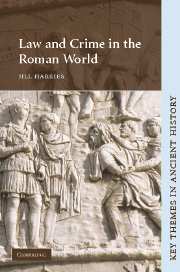Book contents
- Frontmatter
- Contents
- Preface
- 1 Competing discourses
- 2 Public process and the legal tradition
- 3 Cognitio
- 4 The thief in the night
- 5 Controlling elites I: ambitus and repetundae
- 6 Controlling elites II: maiestas
- 7 Sex and the City
- 8 Remedies for violence
- 9 Representations of murder
- Bibliographical essay
- References
- Index
5 - Controlling elites I: ambitus and repetundae
Published online by Cambridge University Press: 05 June 2012
- Frontmatter
- Contents
- Preface
- 1 Competing discourses
- 2 Public process and the legal tradition
- 3 Cognitio
- 4 The thief in the night
- 5 Controlling elites I: ambitus and repetundae
- 6 Controlling elites II: maiestas
- 7 Sex and the City
- 8 Remedies for violence
- 9 Representations of murder
- Bibliographical essay
- References
- Index
Summary
In the second century bc members of the senatorial elite initiated a process of controlling the behaviour of their peers by passing statutes which established a series of standing ‘courts of investigation’ (quaestiones). Being politicians as well as legislators, they were both the controllers and, potentially, the controlled. Their motives may have been idealistic, but they were also self-serving and practical. One problem, which they may not have perceived and certainly did not acknowledge, was that the behaviour which they hoped to control might be open to more than one interpretation. Patronage, for example, was an essential part of the operation of authority and included the exchange of gifts, not (necessarily) for purposes of enrichment but as the expression of honour and friendship. At what point did gifts become bribery, or the reception of a present extortion? When was a service to a client a form of electoral corruption (Lintott 1990)? This cultural difficulty, which affected the operation of the statutes on electoral corruption and ‘extortion’ or recovery (repetundae), illustrates the problem of legislating on offences against the public good. Too much was left to the skills of advocates, the personal influence of the defendants and the prejudices of the judges.
The standing courts were based at Rome and the quaestio-statutes were Rome-centred. The laws on ambitus, electoral corruption, referred to elections at Rome, although they could be adapted elsewhere.
- Type
- Chapter
- Information
- Law and Crime in the Roman World , pp. 59 - 71Publisher: Cambridge University PressPrint publication year: 2007



